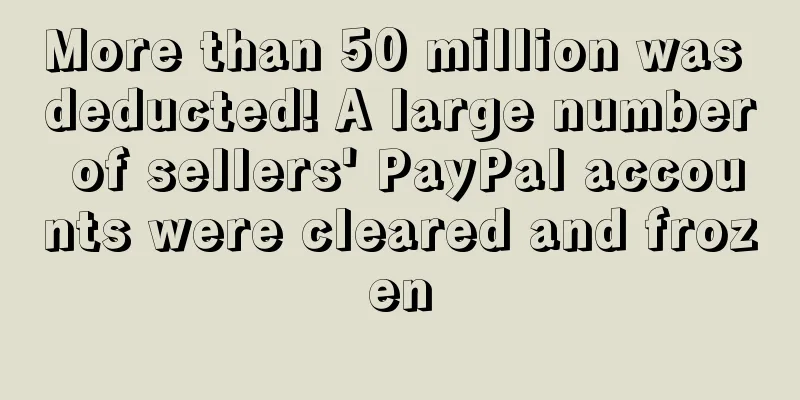More than 50 million was deducted! A large number of sellers' PayPal accounts were cleared and frozen

|
Last year's account blocking wave was undoubtedly a heavy blow to many Chinese sellers. When stores were blocked one after another and accounts were frozen, sellers reached a consensus on deploying multiple platforms. At this time, the new channel of independent stations became the first choice for many sellers.
However, a situation that has emerged in the industry recently has caused sellers who have already set up independent sites to shudder.
A large number of sellers' PayPal accounts have problems, and some sellers have had more than 50 million deducted
Recently, many independent website sellers have reported abnormal situations with their PayPal account funds. Some sellers have found that their PayPal accounts have been cleared and their funds have been frozen.
In response to PayPal's action, a seller claimed that more than 50 million yuan was deducted from the Paypal account bound to the independent website , involving nearly 30 accounts. Another 6 accounts were sued for trademark infringement due to the products sold on the independent websites bound to them, and the frozen funds reached more than 20 million yuan.
In general, the amount of funds deducted and frozen from the seller’s PayPal account has exceeded RMB 70 million.
It is understood that the email sent by PayPal's customer support center shows that the seller was deducted liquidated damages due to violation of the provisions of the "PayPal Fair Use Rules" . For other accounts tied to PayPal, it is necessary to wait for 180 days after the withdrawal function of the account is closed before applying for normal payment.
After the incident, some sellers have started a "rescue operation" for the account involved. Currently, the seller is actively appealing and contacting foreign lawyers to prepare for the subsequent rights protection. At the same time, the seller also expressed the hope that Paypal can give a clear response and a proper solution as soon as possible, otherwise he will choose to protect his rights through legal procedures.
A huge amount of funds were deducted and frozen. In this case, the impact on the seller and the account involved is inevitable. In addition to the direct economic losses, the seller also said that it had a certain impact on the planning of the independent station business, and it is very likely that adjustments will be forced.
There are many sellers who have encountered such situations. Some small and medium-sized independent website sellers have reported that they have encountered the same situation as the above sellers. Like the above sellers, many sellers found that the emails they received also showed "due to violation of PayPal's reasonable use rules".
For the sellers involved, the incident came without warning, and they were at a loss after it happened . They found it difficult to accept PayPal's claim of "violating the fair use rules". In the eyes of these sellers, PayPal did not specify which behavior or product violated the fair use rules, and the funds were deducted without explanation, which was unreasonable.
On the other hand, whether the funds that have not yet been deducted can be safely retrieved later is what sellers are most concerned about at the moment.
In fact, this is not PayPal's first action. As early as late March 2020, PayPal also cleaned up thousands of seller accounts. At that time, all the funds in the accounts involved were directly frozen, with a loss of more than 100 million US dollars. It is not difficult to see that PayPal's rectification has never stopped.
Small and medium-sized sellers are hit hard, is it a cleanup or a violation?
According to sellers’ feedback, the deduction and freezing of PayPal accounts is not limited to some big sellers. Many small and medium-sized independent website sellers have also suffered heavy losses. Many sellers said that their PayPal accounts were deducted, and some were even directly cleared. The amount of money deducted from a single account ranged from thousands to hundreds of thousands of US dollars.
As a result, news spread in the circle that PayPal had launched a new round of cleanup and rectification actions targeting accounts in China, and many sellers were worried that incidents similar to last year's account suspension would happen again.
It is understood that due to the relatively loose supervision of independent sites, problems such as infringement of operator trademarks and rampant counterfeit goods occur frequently and cannot be stopped despite repeated bans. Although Shopify/Facebook/PayPal and others have been vigorously cracking down on violations, they still cannot be eradicated.
And according to foreign practices, if consumers encounter violations and fraudulent activities, they can directly ask the payment institution for compensation. PayPal has launched a rectification campaign and it is very likely that it has paid a considerable amount of compensation as a result.
However, some sellers on independent websites said that most of the sellers whose funds were frozen this time were probably complained about for selling infringing products . After all, PayPal is a payment platform that makes money by relying on the withdrawal fees from sellers. It will not freeze sellers' funds for no reason.
“If a small number of sellers are blocked, it may be due to illegal operations. Sellers who sell goods normally do not need to worry. If most sellers are blocked, it may be because they have been reported or targeted,” said a seller.
Many sellers also said that they were operating in compliance with the law and that PayPal had accidentally hurt them, just like the innocent people hurt by Amazon's account suspension last year. It is understood that there are also scammers among overseas buyers who, in order to extort the sellers' goods and funds, will claim that they have not received the goods even though they have received them, and file complaints with payment channels, demanding refunds. Payment channels will often favor buyers and refund them.
Under such circumstances, some independent website sellers said that they were like "fish on the chopping board, at the mercy of everyone". Not only were their accounts on third-party platforms blocked at will, but their account funds were also frozen at will.
PayPal responded: Violation of relevant policies and rules
PayPal also responded to the closure of PayPal accounts of a large number of independent website sellers .
PayPal said it is committed to protecting the legitimate rights and interests of both sellers and buyers, and will maintain a legal and fair cross-border e-commerce transaction environment by cracking down on illegal buying and selling activities. In addition, PayPal is also conducting strict inspections on whether users comply with the "Fair Use Rules". Sellers who violate the rules and the " PayPal User Agreement" will pay a certain amount of liquidated damages.
According to PayPal 's official response, many sellers violated PayPal 's policies and rules, and PayPal 's decision was within the legal scope.
It is understood that PayPal will restrain sellers through four measures: freezing (freezing suspicious transactions based on risk control models), account restrictions (unable to withdraw cash, receive or make payments), reserves (reserving funds to resolve existing disputes), and fines (violating the "Reasonable Use Rules" and paying a penalty of US$2,500 per time). These are reflected in the "PayPal User Agreement" and the "PayPal Reasonable Use Rules".
Some industry insiders pointed out that this incident was caused by the penalty measures, which had a wide impact and caused abnormalities in the suspension of PayPal accounts of many sellers.
For sellers whose PayPal accounts are blocked due to abnormalities, they can try to negotiate with PayPal officially, send a letter of appeal, explain the facts and reasons, contact a US lawyer, and prepare relevant materials, etc.; secondly, conduct a self-inspection of the PayPal account and strictly supervise the sales withdrawal operations; also pay close attention to the progress of the case, actively prepare the response and related materials, and follow up at any time.
There is no absolute "shortcut" for either Amazon or independent websites. The PayPal incident also indirectly proves that cross-border e-commerce is moving towards compliance. Even with a multi-platform layout, sellers must not take it lightly. It is necessary to register trademarks before newly developed products enter the market. In addition, compared with Amazon sellers, independent website sellers should pay more attention to the "freedom" of independent websites, enhance their own strength, and at the same time abide by platform rules and eliminate all behaviors that may touch the red line. Amazon Independent website PayPal |
<<: Subscription services boost e-commerce growth, expected to reach $1.5 trillion by 2025!
Recommend
Quick Look! The Top Ten E-Commerce Sites with the Worst Shopping Experience in the United States
In 2020, affected by the epidemic, more and more ...
Cross-border merchants prepare for overseas summer promotions during 618, Cainiao launches six measures to help Chinese products go global
On June 17 , Cainiao International launched six m...
TikTok launches Android TV version, currently only available in the UK, France and Germany
According to foreign media theverge , a TikTok fo...
Musk and Trump had a live conversation, and Anker became the "biggest winner"!
In the past two days, the news that Trump is prom...
Amazon's home appliance sellers have the highest income, and the grocery category is the most competitive!
Amazon brand acquirer Thrasio has analysed data f...
What is Slickdeals
Slickdeals , referred to as SD, is the largest pr...
AliExpress Logistics New Announcement: Sales and Transportation of Some Products Suspended
AliExpress has decided to suspend the sales of al...
What is Hanwen International? Hanwen International Review, Features
HVF (Shenzhen HVF International Freight Forwardin...
What is Grailed? Grailed Review, Features
Grailed is a second-hand luxury menswear resale w...
Tmall 618 launched a wave of Chinese sports brands going overseas, Li Ning and Huili led the "five major Chinese sports brands"
During Tmall 618, the three major domestic sports...
What is Ethos Life? Ethos Life Review, Features
Founded in 2016, Ethos Life is an insurance techn...
What is cjjewels? cjjewels Review, Features
cjjewels is an online jewelry website that provide...
What is Serena & Lily? Serena & Lily Review, Features
Serena & Lily specializes in homewares that ar...
Scrapped goods worth 140 million! Shenzhen's big sellers were hurt by Amazon
As we all know, in 2021, the cross-border e-comme...
Behind Temu’s surge: a group of sellers are clearing out their stocks at a loss!
When it comes to Temu, many sellers' first im...









